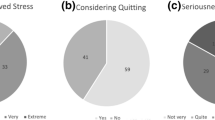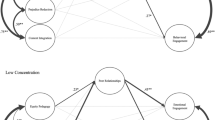Abstract
This research partially replicated Nilsson and Anderson’s Professional Psychology: Research and Practice (2004) study on training and supervising international students. It investigated the relationships among international counseling students’ training level, acculturation, supervisory working alliance (SWA), counseling self-efficacy (COSE), role ambiguity (RA) and multicultural discussion (MD) in supervision. In the present study (N = 71), two acculturation variables and RA predicted SWA. SWA and MD did not predict COSE, while language use in acculturation did. Training level differences were only associated with COSE. Findings indicate that supervisors should attend to role ambiguity and multicultural issues when supervising international students, including acculturation issues and their impact on students’ performance. Results are discussed against Nilsson and Anderson’s original study and the implications for supervision of international counseling students.
Similar content being viewed by others
References
Baker, D. E. (1990). The relationship of the supervisory working alliance to supervisor and supervisee narcissism, gender, and theoretical orientation. Dissertation Abstracts International, 51(7-B), 3602–3603.
Barrett-Lennard, G. T. (1962). Dimensions of therapist response as causal factors in the therapeutic change. Psychological Monographs, 76(42, Whole No. 562).
Bordin, E. S. (1979). The generalizability of the psychodynamic concept of the working alliance. Psychotherapy: Theory, Research, and Practice, 16, 252–260. doi:10.1037/h0085885.
Bordin, E. S. (1983). A working alliance model of supervision. Counseling Psychologist, 11, 35–42. doi:10.1177/0011000083111007.
Chen, C. P. (1999). Common stressors among international college students: research and counseling implications. Journal of College Counseling, 2, 49–65.
Clawson, T. W., Henderson, D. A., Schweiger, W. K., & Collins, D. R. (2004). Counselor preparation: Programs, faculty, trends (11th ed.). New York: Brunner-Routledge.
Cohen, J. (1992). Statistics a power primer. Psychology Bulletin, 112, 155–159. doi:10.1037/0033-2909.112.1.155.
Daniels, J. A., & Larson, L. M. (2001). The impact of performance feedback on counseling self-efficacy and counselor anxiety. Counselor Education and Supervision, 42, 120–130.
Efstation, J. F., Patton, M. J., & Kardash, C. M. (1990). Measuring the working alliance in counselor supervision. Journal of Counseling Psychology, 37, 322–329. doi:10.1037/0022-0167.37.3.322.
Ellis, M. V., & Ladany, N. (1997). Inferences concerning supervisees and clients in clinical supervision: An integrative review. In C. E. Watkins Jr. (Ed.), Handbook of psychotherapy supervision (pp. 447–507). New York: Wiley.
Gatmon, D., Jackson, D., Koshkarian, L., Martos-Perry, N., Molina, A., Patel, N., et al. (2001). Exploring ethnic, gender, and sexual orientation variables in supervision: do they really matter? Journal of Multicultural Counseling and Development, 29, 102–113.
Horvath, A. O., & Greenberg, L. S. (1989). Development and validation of the working alliance inventory. Journal of Counseling Psychology, 36, 223–233. doi:10.1037/0022-0167.36.2.223.
Killian, K. D. (2001). Differences making a difference: cross-cultural interactions in supervisor relationships. Journal of Feminist Family Therapy, 12, 61–103. doi:10.1300/J086v12n02_03.
Lacrosse, M. B., & Barak, A. (1976). Differential perception of counselor behavior. Journal of Counseling Psychology, 23, 170–172. doi:10.1037/0022-0167.23.2.170.
Ladany, N., & Friedlander, M. L. (1995). The relationship between the supervisory working alliance and trainees’ experience of role conflict and role ambiguity. Counselor Education and Supervision, 34, 220–231.
Larson, J. M., & Daniels, J. A. (1998). Review of the counseling self-efficacy literature. Counseling Psychologist, 26, 179–218. doi:10.1177/0011000098262001.
Larson, L. M., Suzuki, L. A., Gillespie, K. N., Potenza, M. T., Bechtel, M. A., & Toulouse, A. L. (1992). Development and validation of the Counseling Self-Estimate Inventory. Journal of Counseling Psychology, 39, 105–120. doi:10.1037/0022-0167.39.1.105.
Mittal, M., & Wieling, E. (2006). Training experiences of international doctoral students in marriage and family therapy. Journal of Marital and Family Therapy, 32, 369–383. doi:10.1111/j.1752-0606.2006.tb01613.x.
Mori, Y., Inman, A. G., & Caskie, G. I. L. (2009). Supervising international students: relationship between acculturation, supervisor multicultural competence, cultural discussions, and supervision satisfaction. Training and Education in Professional Psychology, 3, 10–18. doi:10.1037/a0013072.
Ng, K.-M. (2006a). Counselor educators’ perceptions of and experiences with international counseling students: an online exploratory study. International Journal for the Advancement of Counselling, 28, 1–19. doi:10.1007/s10447-005-8492-1.
Ng, K.-M. (2006b). International students in CACREP-accredited counseling programs. Journal of Professional Counseling: Practice, Theory, and Research, 34, 20–32.
Ng, K.-M., & Smith, S. D. (2009). Perception and experiences of international trainees in counseling and related programs. International Journal for the Advancement of Counselling, 31, 57–70. doi:10.1007/s10447-008-9068-7.
Nilsson, J. E. (2007). International students in supervision: course self-efficacy, stress, and cultural discussions in supervision. The Clinical Supervisor, 26, 35–47.
Nilsson, J. E., & Anderson, M. Z. (2004). Supervising international students: the role of acculturation, role ambiguity, and multicultural discussions. Professional Psychology: Research and Practice, 35, 306–312. doi:10.1037/0735-7028.35.3.306.
Nilsson, J. E., & Dodds, A. K. (2006). A pilot phase in the development of the International Student Supervision Scale. Journal of Multicultural Counseling & Development, 34, 50–62.
Olk, M. E., & Friedlander, M. L. (1992). Trainees’ experiences of role conflict and role ambiguity in supervisory relationships. Journal of Counseling Psychology, 39, 389–397. doi:10.1037/0022-0167.39.3.389.
Pattison, S. (2003). Cultural diversity: mapping the experiences of students on an international counselor training programme. Counselling and Psychotherapy Research, 3, 107–113. doi:10.1080/14733140312331384472.
Sangganjanavanich, V. F., & Black, L. L. (2009). Clinical supervision for international counselors-in-training: implications for supervisors. Journal of Professional Counseling: Practice, Theory & Research, 37, 52–65.
Schafer, W. D. (2001). Replication: a design principle for field research. Practical Assessment, Research & Evaluation, 7(15). Retrieved October 19, 2010 from http://PAREonline.net/getvn.asp?v=7&n=15.
Smith, S. D., & Ng, K.-M. (2009). International counseling trainees’ experiences and perceptions of their multicultural counseling training in the United States: a mixed method inquiry. International Journal for the Advancement of Counselling, 31, 271–285. doi:10.1007/s10447-009-9083-3.
Sodowsky, G. R., Lai, E. W., & Plake, B. S. (1991). Psychometric properties of the American-International Relations Scale. Educational and Psychological Measurement, 51, 207–216. doi:10.1177/0013164491511020.
Stoltenberg, C. (1981). Approaching supervision from a developmental perspective: the counselor-complexity model. Journal of Counseling Psychologists, 28, 59–65.
Watkins, C. E., Jr. (1998). Psychotherapy supervision in the 21st century: some pressing needs and impressing possibilities. Journal of Psychotherapy Practice and Research, 7, 93–101.
Acknowledgement
This study was partially funded by the Association for Counselor Education and Supervision Research Grant Award.
Author information
Authors and Affiliations
Corresponding author
Rights and permissions
About this article
Cite this article
Ng, KM., Smith, S.D. Training Level, Acculturation, Role Ambiguity, and Multicultural Discussions in Training and Supervising International Counseling Students in the United States. Int J Adv Counselling 34, 72–86 (2012). https://doi.org/10.1007/s10447-011-9130-8
Published:
Issue Date:
DOI: https://doi.org/10.1007/s10447-011-9130-8




